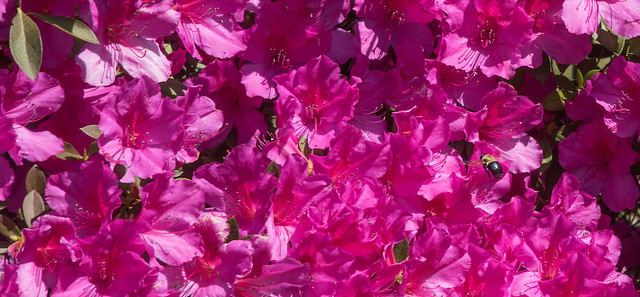Auburn University named first Bee Campus USA in Alabama
Article body
Bee Campus USA recently announced Auburn University as the first university in Alabama to be certified as an affiliate of the Bee Campus USA program, designed to marshal the strengths of educational campuses for the benefit of pollinators.
The university joins a group of 39 campuses nationwide, aiming to raise awareness of pollinators, food production, native plant species and integrated pest management, all while stimulating the nation’s economy through species protection and the services that those efforts support.
"Imperiled pollinators are responsible for the reproduction of 90 percent of the world’s wild plant and tree species,” said Phyllis Stiles, Bee Campus USA director. “Auburn University is a stellar example of the influence educational institutions can have on their students and the broader community. Their talented faculty, staff and students offer an invaluable resource for Alabama residents in seeking ways to manage ornamental landscapes in more wildlife-friendly ways.”
These efforts are enabling Auburn’s faculty and staff to bridge the academic and operational divide to create new opportunities in research, instruction and extension related to pollinators and environmental health.
The Auburn Bee Campus USA Committee began as an informal working group in early 2017 focused on unifying the multi-faceted, pollinator-related efforts already under way on campus. The committee now serves as a network of representatives from the academic, extension and operational areas of the university.
“It really was a team effort and a testament to the forward, sustainable thinking of many folks on campus,” said Geoffrey Williams, assistant professor in the Department of Entomology and Plant Pathology and member of the Auburn Bee Campus USA Committee.
To receive the Bee Campus USA designation, Auburn must uphold seven commitments focused on protecting pollinators and their habitats, along with promoting awareness of the roles they play and how others can join efforts to support them.
The student organization Auburn for Bees is transforming campus awareness as the members educate the importance of bees to students and work directly with the Auburn University Laboratory of Insect Pollination and Apiculture, also known as Williams’ “Auburn Bee Lab.”
“This designation is an excellent step toward the protection and education of bees, and I’m proud to see Auburn follow in the steps of other big schools participating in Bee Campus USA,” said Kressie Kornis, president and founder of Auburn for Bees. “Spreading awareness is the easiest step a person can take if they would like to contribute to this cause.”
Auburn for Bees established Beeducation, a new program where the students travel to local elementary schools and talk to children in the Auburn community about bees.
“Seeing how passionate children are about the bees through Beeducation makes me wish older generations like mine had that positive and inquisitive attitude toward bees,” said Kornis. “I know I was never taught about bees in school, and I think this is how that begins.”
Other members in the Auburn Bee Campus USA Committee include representatives from the School of Architecture, Planning and Landscape Architecture; the Department of Geosciences; the Department of Horticulture; Tiger Dining; Facilities Management; Campus Planning and Space Management; and the Office of Sustainability.
Related Media
Media interested in this story can contact Communications Director Preston Sparks at (334) 844-9999 or preston.sparks@auburn.edu.
Auburn University is a nationally ranked land grant institution recognized for its commitment to world-class scholarship, interdisciplinary research with an elite, top-tier Carnegie R1 classification, life-changing outreach with Carnegie’s Community Engagement designation and an undergraduate education experience second to none. Auburn is home to more than 30,000 students, and its faculty and research partners collaborate to develop and deliver meaningful scholarship, science and technology-based advancements that meet pressing regional, national and global needs. Auburn’s commitment to active student engagement, professional success and public/private partnership drives a growing reputation for outreach and extension that delivers broad economic, health and societal impact.





